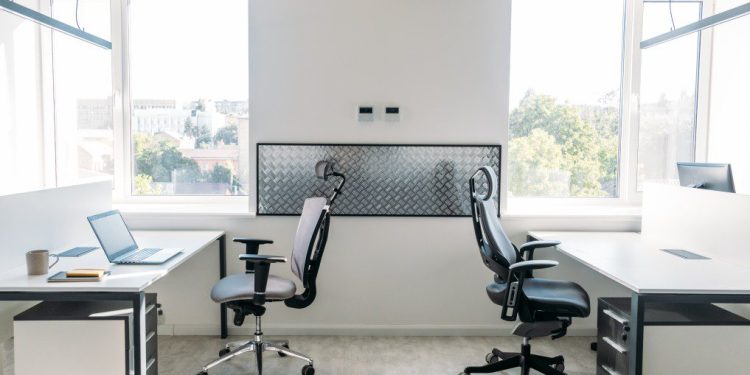In today’s dynamic business landscape, the concept of office space is evolving alongside the growing trend of flexible work arrangements. Businesses of all sizes are re-evaluating their workspace needs, seeking options that cater to their specific requirements and promote agility. This has led to the rise of serviced offices as a viable alternative to traditional office leases. But what exactly are serviced offices, and how do they differ from the traditional office space model?
Explore the features of a suitable serviced office in Bangkok that reflects your business.
Serviced Offices: A Fully Equipped and Managed Workspace Solution
A serviced office can be understood as a fully equipped and managed workspace solution designed to meet the needs of modern businesses. Imagine a turnkey operation where you simply walk in with your laptop and start working. Serviced offices offer private offices, open-plan workspaces, and even co-working areas, all equipped with high-speed internet, ergonomic furniture, and essential office supplies. Beyond furniture, serviced offices typically provide a range of additional benefits, including:
- Technology infrastructure: Reliable internet connectivity, phone lines, and IT support are often included in serviced office packages.
- Reception services: Professional receptionists can greet your clients, handle phone calls, and manage mail distribution, freeing you to focus on core business activities.
- Meeting and conference rooms: Fully equipped meeting rooms are readily available for presentations, client meetings, or team collaborations.
- Building amenities: Many serviced offices offer shared amenities like break rooms, kitchens, printing services, and even on-site gyms, fostering a sense of community and convenience.
Traditional Office Space: A Leased Property Requiring Tenant Management
Traditional office space, on the other hand, refers to a physical office location leased from a landlord. This option grants businesses complete control over the space but also comes with a significant responsibility for managing and maintaining it. When leasing traditional office space, tenants are typically responsible for:
- Furnishing the office: Desks, chairs, filing cabinets, and other furniture need to be purchased or leased separately.
- IT setup and maintenance: Businesses must arrange for internet connectivity, phone lines, and any necessary IT equipment and support.
- Utilities and cleaning services: Paying for electricity, water, janitorial services, and waste disposal falls on the tenant’s shoulders.
- Building maintenance: Any repairs or maintenance issues within the leased space become the tenant’s responsibility.
Key Differences Between Serviced and Traditional Offices: A Breakdown
While both serviced and traditional office spaces provide a physical location for businesses to operate, several key differences set them apart:
- Level of Service
The primary distinction lies in the level of service offered. Serviced offices take care of most operational aspects, allowing businesses to focus on their core activities. Traditional office spaces, on the other hand, require a significant investment of time and resources for management and maintenance.
- Flexibility and Scalability
Serviced offices offer unmatched flexibility and scalability. Businesses can easily adjust their office space needs based on growth or downsizing. Adding or reducing workstations or even relocating to a larger or smaller space within the serviced office building can be done with minimal disruption. Traditional leases, however, typically lock businesses into a fixed space for a specific period, making it challenging to adapt to changing needs.
- Cost Structure
The cost structure of serviced and traditional offices presents another key difference. Serviced offices typically operate on an all-inclusive monthly fee that covers rent, utilities, furniture, amenities, and often even basic printing and internet. Traditional office spaces require separate payments for rent, utilities, furniture, technology, and any additional services. While serviced offices might seem more expensive at first glance, the all-inclusive nature can lead to significant cost savings for businesses, especially those with smaller teams or fluctuating needs.
- Upfront Investment
Setting up a traditional office space often requires a significant upfront investment for furniture, equipment, and security deposits. Serviced offices eliminate this barrier to entry, allowing businesses to start operating quickly with minimal upfront costs.
Choosing Between Serviced and Traditional Offices: Finding the Right Fit
The decision between a serviced office and a traditional office space ultimately depends on your specific business needs and priorities. Here are some factors to consider when making your choice:
- Business size and needs: Smaller businesses or startups might find serviced offices ideal due to their flexibility and scalability. Larger companies with established needs might prefer the customization options offered by traditional leases.
- Budget: Carefully consider your budget and ongoing costs. While serviced offices might seem pricier initially, the all-inclusive nature can provide cost savings compared to managing a traditional space.
- Desired level of control and customization: Serviced offices offer a standardized experience, while traditional spaces allow for more control over design and layout.
- Need for flexibility and scalability: If your business is in a growth phase or anticipates frequent changes in team size, the flexibility of serviced offices is a major advantage. Traditional leases can feel restrictive in such scenarios.
- Company culture: Consider the work environment you want to cultivate. Serviced offices offer a collaborative and social atmosphere, while traditional spaces allow for a more controlled environment.
Conclusion
In conclusion, both serviced offices and traditional office spaces offer viable options for businesses seeking a physical workspace. Serviced offices provide a fully equipped, managed solution ideal for businesses seeking flexibility, scalability, and a streamlined operational experience. Traditional office spaces, on the other hand, offer greater control and customization but require significant tenant involvement in management and maintenance. By carefully evaluating your specific business needs and priorities, you can determine which option best positions your company for success. Remember, there’s no one-size-fits-all solution. The key is to choose the workspace that empowers your team, fosters productivity, and aligns with your long-term business goals.
Secure a Suitable Office Space for Your Business
Explore your options and find the perfect fit! Visit https://property.jll.co.th/th/ to browse a wide range of office spaces and connect with JLL’s Thailand property experts. They’ll guide you towards the workspace solution that fuels your success.




















